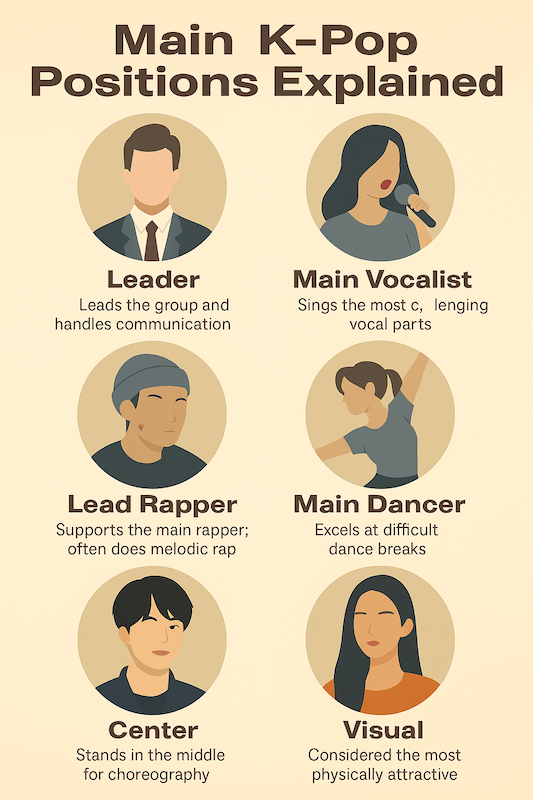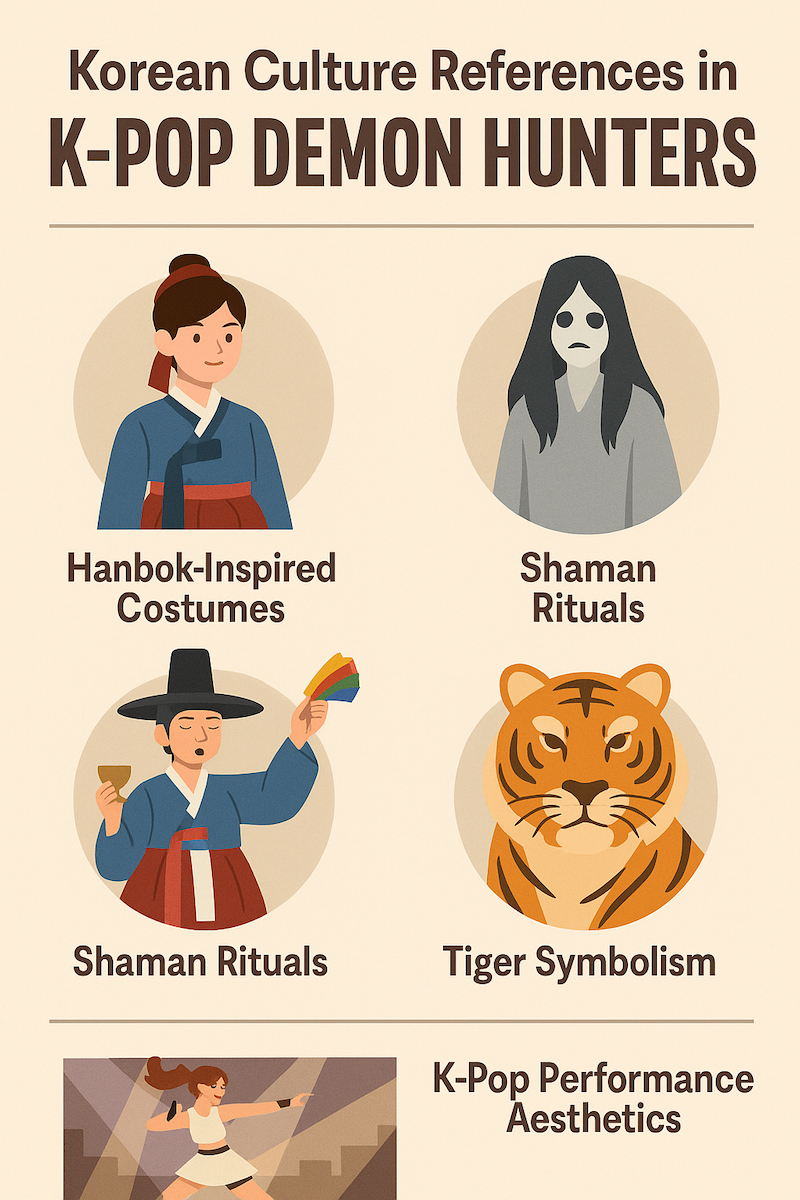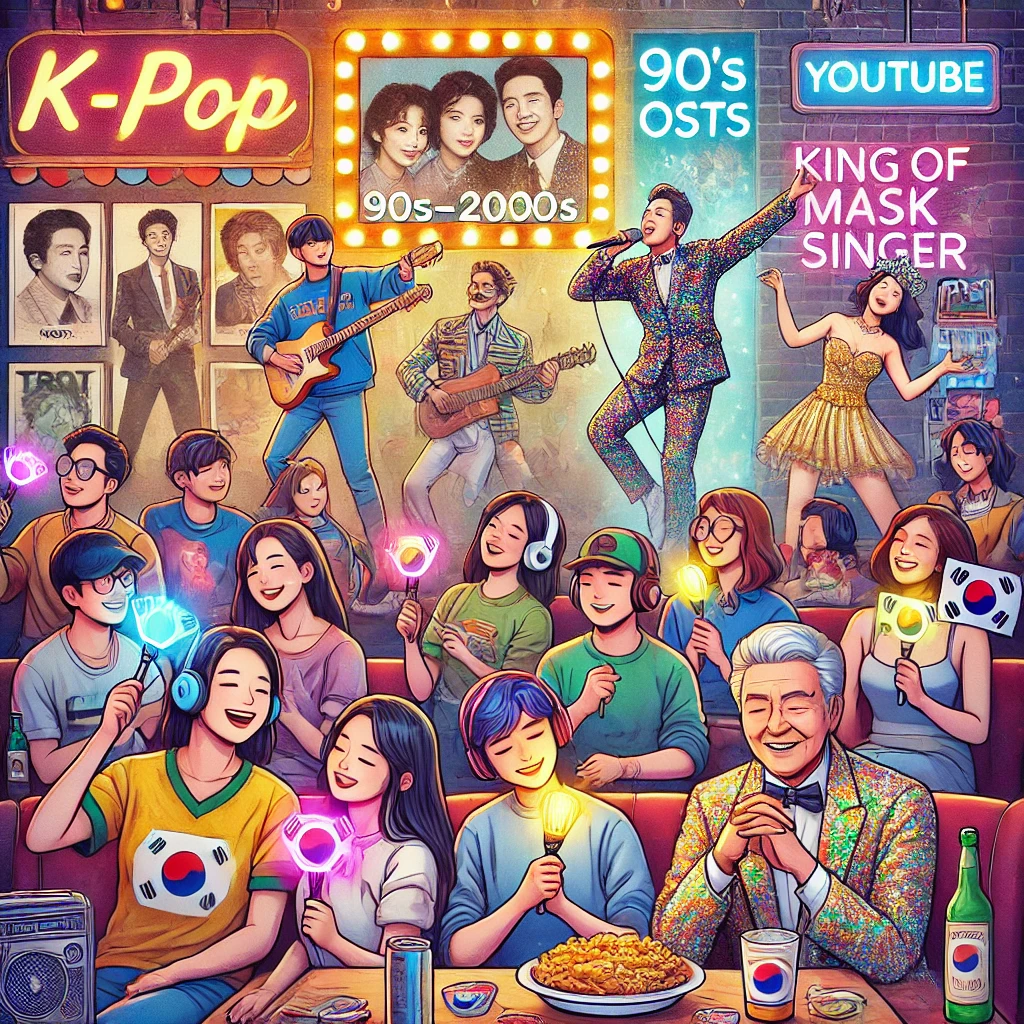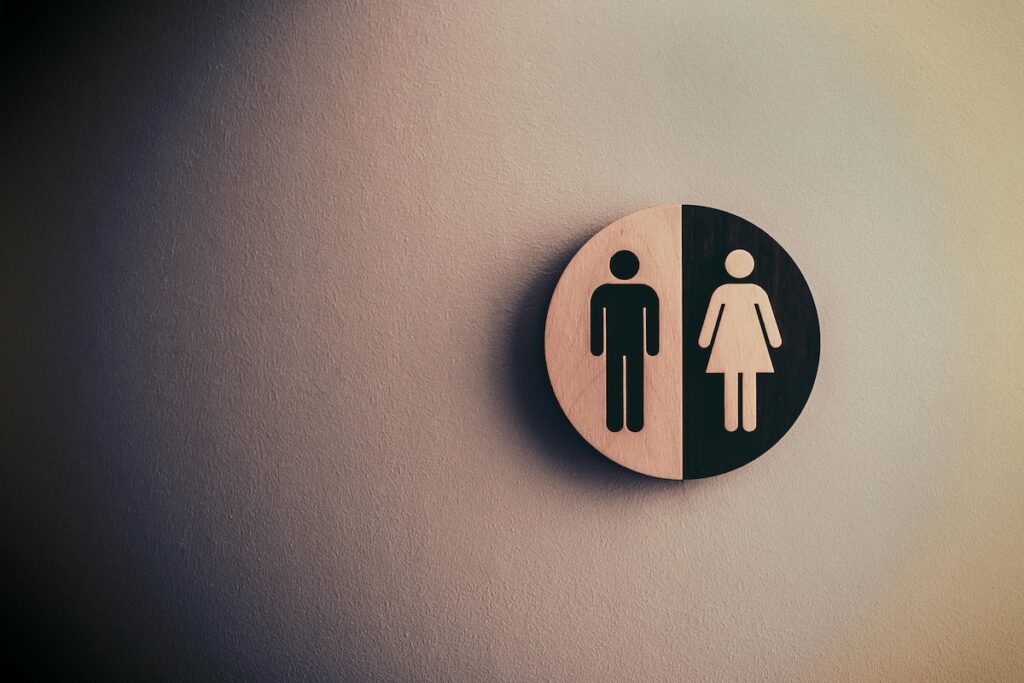“Every fan should have K-Pop Positions Explained clearly to understand how their favorite groups function.”
K-pop positions such as leader, main vocal, and dancer are essential roles every fan should understand. If you’re new to K-Pop, you’ve probably heard terms like Main Vocal, Lead Rapper, Center, or Visual when fans talk about idols.
These aren’t just fancy titles — in the world of K-Pop, a position defines each member’s main role in the group, both on and off stage.
In Western pop groups, roles are often less defined, but in K-Pop, positions are an essential part of the group’s identity.
They determine who sings the high notes, who delivers the dance break, who represents the group in interviews, and even who stands in the center for performances and photos.
Let’s break down every major K-Pop position, explain what each role does, and see which idols are the best-known examples.

1. Leader
Role:
- Represents the group in interviews and public appearances
- Manages communication between the members and the agency
- Keeps the team organized during rehearsals and schedules
- Helps resolve conflicts within the group
Traits:
- Often chosen for responsibility, charisma, and communication skills
- Not always the oldest member
Famous Leaders:
- RM (BTS) – Multilingual, charismatic, and respected worldwide
- Taeyeon (Girls’ Generation) – Strong stage presence and musical direction
- Suho (EXO) – Known for being dependable and caring towards members
2. Main Vocalist
Role:
- Handles the most technically difficult parts of a song
- Sings high notes, ad-libs, and emotional bridges
- Maintains vocal stability during live performances
Famous Main Vocalists:
- Taeyeon (Girls’ Generation) – Emotional powerhouse
- Jungkook (BTS) – Known for stability and smooth tone
- Baekhyun (EXO) – Powerful yet versatile voice
- Rosé (BLACKPINK) – Unique tone and emotional delivery
3. Lead Vocalist
Role:
- Supports the Main Vocalist and often sings significant portions of the chorus
- Known for distinct tone or smooth midrange
Examples:
- Jimin (BTS) – Soft, expressive voice
- Taemin (SHINee) – Combines strong vocals with dancing
- Jisoo (BLACKPINK) – Warm midrange tone
4. Main Dancer
Role:
- Leads the dance performance
- Handles the most complex choreography and dance breaks
- Often contributes to choreography design
Famous Main Dancers:
- J-Hope (BTS) – Energetic and precise movements
- Kai (EXO) – Artistic and fluid dance style
- Lisa (BLACKPINK) – Known as one of the best dancers in K-Pop
- Hyoyeon (Girls’ Generation) – Powerful and charismatic performer
5. Lead Dancer
Role:
- Supports the Main Dancer
- Maintains stage balance and often appears at the front during transitions
Examples:
- Jimin (BTS) – Combines Lead Dancer skills with strong vocals
- Yuna (ITZY) – Youthful energy and sharp movements
6. Main Rapper
Role:
- Delivers the most challenging rap parts
- Often writes or arranges rap sections
- Brings intensity and identity to the group’s sound
Examples:
- RM (BTS) – Lyricist, producer, and leader
- G-Dragon (BIGBANG) – Iconic rapper and style influencer
- Chaeryeong (ITZY) – Blends rap with performance skills
7. Lead Rapper
Role:
- Supports the Main Rapper with complementary rap lines
- Often performs melodic rap for smoother transitions
Examples:
- Jennie (BLACKPINK) – Both vocalist and rapper
- Suga (BTS) – Known for deep, impactful lyrics and flow
8. Center
Role:
- Stands in the middle for choreography and photo shoots
- Often embodies the group’s overall concept
- Recognizable face for casual audiences
Examples:
- Jungkook (BTS) – “Golden Maknae” with all-round talent
- Nayeon (TWICE) – Cheerful and bright presence
- Jang Wonyoung (IVE) – Perfect proportions and charisma
9. Visual
Role:
- Official “face” of the group, chosen for standout visuals
- Attracts media and commercial opportunities
- Often plays a key role in bringing in new fans
Examples:
- Jin (BTS) – Self-proclaimed “Worldwide Handsome”
- Suzy (miss A) – Korea’s “Nation’s First Love”
- Cha Eun-woo (ASTRO) – “Manhwa” (comic book) good looks
10. Sub Vocal / All-Rounder
Role:
- Flexible position: fills in wherever needed
- Can sing, rap, or dance depending on the song
Examples:
- V (BTS) – Distinct tone and stage charisma
- Dahyun (TWICE) – Known for variety skills and multi-talent
Conclusion – More Than Just Titles
In K-Pop, positions aren’t just labels — they’re the result of years of training and strategic group planning.
Knowing each position will help you appreciate performances more deeply, understand line distribution, and spot the subtle ways each member contributes to the group’s success.
Whether you’re a casual listener or a dedicated stan, learning these roles will make you see your favorite idols in a whole new light.





